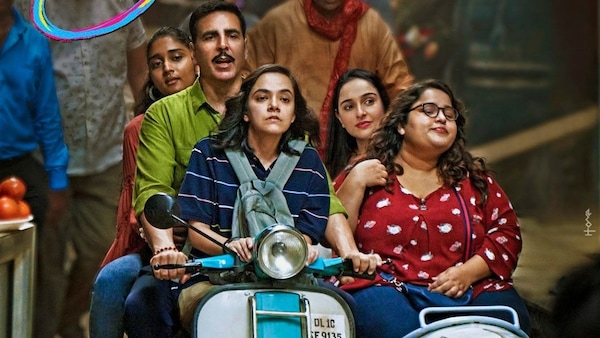Raksha Bandhan review: Akshay Kumar-starrer is problematic yet poignant
Raksha Bandhan can be funny and infuriating in the same shot, but, then again, so are families.

Last Updated: 09.49 AM, Aug 11, 2022
On her deathbed, Lala Kedarnath's (Akshay Kumar) now-deceased mother had only one wish: for him to marry off his four sisters to "good" families. Dated ideologies, laced with silly happenstance humour, are never really a good mix. But, there's something about the social commentary that makes one reach for the tissues. Is it the shedding of the pretence of having the perfect family life that gets you, or is it just you lapping up the festive fervour? This one's a riddle and only Akshay Kumar and Anand L. Rai seem to have cracked the code... somewhat.
It is rather ironic that the writer (Kanika Dhillon), who once penned the reasonably emancipating Size Zero (2015) with South Indian actress Anushka Shetty—a 'hefty' career move that went on to become trollers' playing field; paradise—would, unflatteringly, regress to inserting the kaali-hai-moti-hai-isse-shaadi-kaun-karega narrative in a post-modern social film, supposedly designed for squashing those very primitive ideas.
In the hyperactive universe of Raksha Bandhan, somewhere along the dingy—and hopelessly congested—lanes of New Delhi's Chandni Chowk area, lived a man who felt tremendously responsible for his little bratty but mostly adorable younger sisters: Gayatri (Sadia Khateeb), Durga (Deepika Khanna), Laxmi (Smrithi Srikanth), and Saraswati played by Sahejmeen Kaur. Gradually crushing under a mountain of debt, with a childhood sweetheart who wouldn't take no for an answer (Sapna, played by Bhumi Pednekar), Rai's' "hero" exudes the energy of a 90s male act that is three decades too late.
In come the emotions, theirs and yours, and the customary festive release starts to grow on you. Suddenly, the Nirav Modi jokes make you chuckle, the banter between the on-screen siblings resonates, or at the very least, reminds you of your own simpler days, and by the time the film hits its mid-mark, you are all in.
If the first half was all pretty and pretty funny, can tepidity be too far away? The short answer is 'No!' All that human connection and familial ties aside, it gets overbearing in the middle to see everyone in the movie do one of two things: hurl insults or sob. When a basic, take-note approach is employed to enlighten the masses about the complex issues attached to the social evil that is the dowry system, even the 'Pushpa, I hate tears' adage cannot stick. Eh?
But Akshay Kumar is, quite frankly, at ease with himself as Lala. The whole often-condescending-but-otherwise-righteous avatar does not give off the impression that Kumar is trying too hard to love or even be liked. Bhumi's stubborn Sapna may not be her finest work to date—and that's only because she had set the bar high early on—but, as a pair, the duo is pleasant in their own oddball-ish fashion.
Sadia Khateeb, perhaps the most well-known of the four young actors, has obviously honed her acting chops since that controversial debut with Vidhu Vinod Chopra (Shikara/2020), and if it weren't for the angles, we would say she is almost flirting with the camera. Likewise, Khanna, Srikanth, and Kaur contribute to the plot's progression with their freshness and unique on-screen personas. Although a tad bit rushed, the girls do get their due screen time in the film.
Raksha Bandhan can be funny and infuriating in the same shot, but, then again, so are families.
The one-liners should crack you up on a long and lazy weekend, and, of course, we also have the melancholic music and a mawkish diegesis for company. If being overtly emotional is your thing, or you are looking for a good cathartic cry, give this one a go!

 Premium
Premium